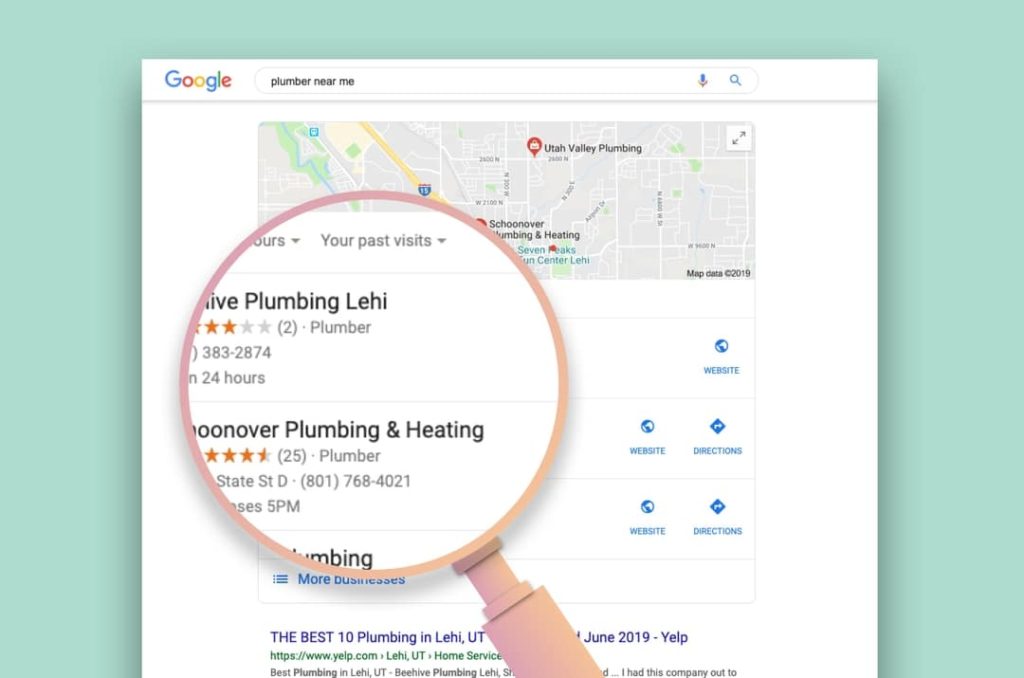If your business focuses on local customers, you’re likely to connect to more of them with local SEO (search engine optimization) techniques. Local SEO strategies help potential customers find your business when they search online for local search terms, such as “mechanic in Memphis” or “furniture Bay Area.”
People searching for these kinds of keywords often have the intent to shop or buy right away. They’re most likely searching using their smartphone while they’re near a business. That means they’re about to visit either your business or another local business—whoever has better search engine results.
To make sure you have the best local search engine results and get more people to your business, we’ve put together these 5 local business SEO tips and tricks you can start implementing right away!
1. Claim and Improve Your Existing Online Business Listings
Major search engines have probably already created online business listings about you, such as a Google My Business listing, which shows up on the right side of Google search results. The accuracy of these listings is an important piece of local SEO strategy that will get you more visibility online.
To claim and improve them, click on those listings and go through the instructions to confirm you’re the business owner of each one. If there isn’t a listing created, you can create one. You’ll then get access to update and enhance the listing through steps such as:
- Filling out your correct address and phone number, which should be a local number
- Uploading pictures of your business, including data about each picture
- Submitting web page addresses that are designed for mobile users

2. Consistent, Increasing Customer Reviews
Getting positive reviews from customers is one of the most powerful local business SEO strategies you can implement. People searching for local products and services love to see what their neighbors think of a business.

To start, make sure to link to various important review sites from your own website for people to navigate to. Don’t depend only on reviews from years ago. Continue getting more reviews. Give your current customers—especially your repeat customers—reminders to leave reviews for you on various sites. Make this a normal and periodic part of your business activities.
Never do anything dishonest, like buying reviews directly from an outside source. And don’t worry if your review history isn’t perfect, because a perfect history looks fake. Simply continue asking for reviews from your actual customers.
3. Backlinks from Local Websites
Get links to your website from websites of other organizations that have local directories or sites targeting your local area, such as your:
- Chamber of Commerce
- City government
- Newspapers
- Tourism board
As part of your link building, brainstorm the type of content that local organizations could use to enhance their websites. What type of blog posts could you write for your tourism board? What sort of ad could you run in a newspaper? Could you perform a study for the Chamber? Then, contact those organizations and propose your quality content.
At the same time, create content to help your potential customers, and post it on your own website and social media accounts. That’ll show those local organizations that you’re a leader in your industry and it’ll attract your prospects.
4. Add Local Keywords to Your Website
Optimizing your website is always a good idea, but to really own local SEO, optimize your website with keywords and content specifically written for your local area. Write as if you’re speaking to your neighbors directly.
Many of your keywords should have local terms in them, including your city and/or your state. Pick several variations of what your potential customers may actually search for to find your business type, such as “dentist in Cleveland.” You can use online tools, like the Google Keyword Planner, to get a list of keywords they may be using.
Add your keywords into your:
- Website addresses
- Page headlines
- Website meta information
- Hypertext for the links pointing to your website from other sites
- Descriptions of your images
- Pages on your website
5. Roll Out to Other Search Engines
As your local SEO techniques start to get results, start using your best-performing ideas on other search engines and platforms, such as Bing, Yahoo, and Facebook.

Ask yourself where your customers spend their time online. Are they on Facebook a lot, for example? Try to meet them where they are.


